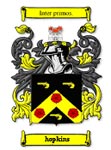|
Origins of the
Family Names and their Coat of Arms
|
| |
|
HOPKINS
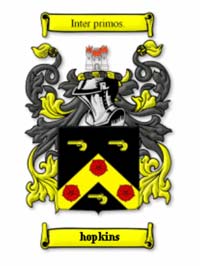 |
Recorded as Hopkin, Hopkins, Hopkinson, and since the 17th century
much associated with Wales, this is an English patronymic derivative
of the original pre 5th century Germanic warrior name Hrod-berht,
translating as ‘renowned-fame’. ‘Borrowed’ by the French around the
time of the Emperor Charlemagne in the 8th century, its spelling was
slightly changed to Robert and became equally popular. In that
spelling that it was introduced into England, Scotland and
ultimately Wales, after the famous Norman Conquest of 1066. Over the
next four hundred years Robert, perhaps as a result of its
interesting meaning was so popular that it developed a wide range of
surname variations, many not obviously connected with Robert -
including this one. These variants now recorded as surnames in the
own right include such short forms as Dob(b), Hob(b), Hop, Nob(b)
and the most direct Rob, Robb, Robin, Robbins, and Robinson. Not
surprisingly with such a pedigree, Hopkins is one of the earliest
recorded surnames with examples in English records such as Nicholas
Hobekyn of the county of Cambridge in the Hundred Rolls of England
in 1273, Rychard Hobbekynessone in the Putname rolls of Cheshire in
1354, and Walter Hopkin of Warton, in the wills record of Lancaster
in 1563. Surnames were much later in Wales than the rest of the
British Isles, and when first recorded and given due allowance for
both a change of language as well as dialect and (indifferent)
spelling, it was as ab Popkyn, or the son of Hopkin. An early Welsh
example was Johannis ab Popkyn in the rolls of the county of
Monmouth in 1610. Over the centuries there were several coats of
arms granted to name holders. The first was probably Hopkinson of
Alford, Lincolnshire, in the time of Queen Elizabeth I (1558 – 1603)
although the most unusual - is to Hopkins of Maryland, in the
American colony of that name, in the year 1764. This was about ten
years before official US independence. |
| |
|
|
FOSTER
|
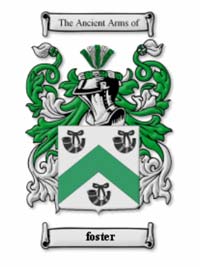 |
This
very interesting English medieval surname, the family name of the
Lords Oriel of Ireland, has at least four possible origins. The
first is an occupational name for a saddle tree maker, a very
important occupation seven hundred or more years ago. Here the
derivation is from the Old French "fustier", itself originating from
the word "fustre", meaning a block of wood. This term was introduced
into Britain after the 1066 Norman French invasion. Secondly, and
again occupational, the name may describe a maker or user of "forcetier",
these being steel shears widely used in both agriculture and textile
production. A third possibility is that Foster is a contracted or
dialectal spelling of Forester, a term which described a civil
officer in charge of a forest. John Forester, who was recorded in
the 1183 Pipe Rolls of the county of Surrey, was the first recorded
bearer of this name. The last possible origin is very unusual. Here
the derivation is from a shortened spelling of the Olde English pre
7th Century compound "cild-fostre", and as such an occupational
nickname for a foster parent or possibly a foster child. John
Foster, who was recorded in the 1373 Court Roll of the borough of
Colchester, Essex, was of this source. The surname was one of the
very first into the New England colonies of America. John Foster,
age unknown, being recorded as being "alive in Virginea, on February
18th 1623". The first recorded spelling of the family name is
probably that of Durand le Fuster, which was dated circa 1179, in
the "Register of St. Bartholomew's Hospital", London, during the
reign of King Henry II, known as "The Builder of Churches", 1154 -
1189. |
| |
|
|
WORMALD
|
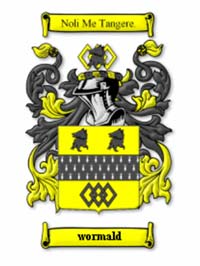 |
This
interesting and unusual name is of Anglo-Saxon origin, and is a
locational surname deriving from either of the places called 'Wormald'
in the parishes of Barkisland and Rishworth in West Yorkshire, or
from the place called 'Wormhill' in Derbyshire. The placename 'Wormald'
means 'Wulfrun's spring, or stream', derived from the Old English
pre 7th Century female personal name 'Wulfrun', composed of the
elements 'wulf', wolf and 'run', secret, with the Northern English 'waell(a)',
spring, stream; the excrescent 'd' of Wormald does not appear until
the 17th Century. The place name 'Wormhill' is recorded in the
Domesday Book of 1086 as 'Wruenete', and means either 'Wyrma's hill'
or 'hill frequented by reptiles', from the Old English personal name
or byname 'Wyrma', 'serpent', or 'wyrm', serpent, reptile, with 'hyll',
hill. The surname can be found as Wormald, Wormhall, Wormal, Wormell,
Warmoll or Wormull. The marriage of John Wormald and Mary Maud was
recorded in Halifax, Yorkshire, on January 16th 1658. The first
recorded spelling of the family name is shown to be that of
Alexander de Wormwall, which was dated 1379, The Yorkshire Poll Tax
Returns, during the reign of King Richard II, 'Richard of Bordeaux',
1377-1399. Surnames became necessary when governments introduced
personal taxation. In England this was known as Poll Tax.
|
| |
|
|
JERRETT
|
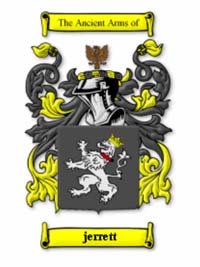 |
Recorded in a large number of forms (see below) some which seem to
be only remotely connected with either original name, this is an
English surname, but of Norman-French and ultimately Germanic
origins. It is derived from either of the two pre 7th century
personal names Gerard or Gerald, which were introduced into England
by followers of William the Conqueror after the Invasion of 1066.
The two names are recorded separately in the Domesday Book of 1086
as "Gerardus" and "Geraldi". Gerard is composed of the elements "geri"
or "gari", meaning "spear", with "hard", hardy, brave or strong,
whilst "Gerald" means "spear-rule" from "geri", as before, and "wald".
Such (sur)names were originally composed of vocabulary elements of
the local language, and no doubt bestowed for their auspicious
connotations. That the names were extremely popular can be seen by
the great number and variety of modern surnames deriving from them
including Garratt, Garrett, Garred, Jarrett, Jerrett, Yarlett and
Yerlott, to Garrod, Jerrard and Jerrold. Recordings from early
church registers include the marriage of Michael and Sarah Jarrett
on February 2nd 1588, at Worth in Surrey, whilst Sarah Yarlett
married William Burke at St James church, Dukes Place, Westminster,
on September 20th 1680. The first recorded spelling of the family
name is shown to be that of John Gerard. This was dated 1230, in the
"Pipe Rolls" of the county of Somerset, during the reign of King
Henry III of England, 1216 - 1272. |
| |
|
|
PORTER
|
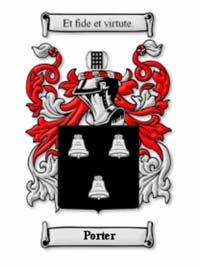 |
This
interesting surname is of Old French origin, and has two possible
sources; firstly, it may be an occupational name for the gatekeeper
of a town, or a doorkeeper of a large house, deriving from the
Middle English "porter", a development of the Old French "portier".
Secondly, it may be an occupational name for a man who carried loads
for a living, especially one who used his own muscle power rather
than a beast of burden or a wheeled vehicle, from the Old French "porteo(u)r"
to carry, convey. The surname is distinguished by being first
recorded in the Domesday Book of 1086 (see below), and early
recordings include William le Portier (1190), in the Pipe Rolls of
Berkshire, and Nicholas le Portur (1263), in "Middle English
Occupational Terms" of Surrey. London Church Records list the
christening of Edward, son of Thomas Porter, on September 14th 1546,
at St. Matthew's, Friday Street, and the christening of John, son of
Edward Porter, on June 24th 1599, at St. Stephen's, Coleman Street.
A Coat of Arms granted to a Porter family in Allerby, Cumberland, is
a red shield, on a gold fess, three blue church bells, a silver
border engrailed. The first recorded spelling of the family name is
shown to be that of Milo Portarius, porter at Winchester Castle,
which was dated 1086, in the "Domesday Book of Hampshire" , during
the reign of King William I, known as "The Conqueror", 1066 - 1087.
Surnames became necessary when governments introduced personal
taxation. In England this was known as Poll Tax.
|
| |
|
|
MATTHEWS
|
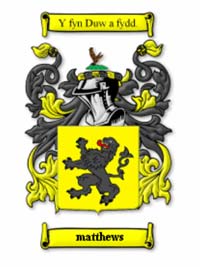 |
This
ancient English and Scottish surname was rarely recorded and never
as a surname, before the Norman Invasion of 1066. Its popularity
dates from the 12th century when returning Crusaders from the Holy
Land gave it to one of their sons in commemoration of the fathers
expedition. The derivation is from the Hebrew male given name "Mattathiah"
meaning "gift of the Lord". It is first recorded in the Domesday
Book of 1086 in the Latin form 'Matthaeus' and in the French
spelling 'Mathieu', but neither of these recordings are surnames,
but names of priests. The surname is first recorded in the mid 13th
Century and early examples include John Mathows of Whitby in
Yorkshire in 1395 and Hugh Mathewman in the 1379 Poll Tax rolls,
also of Yorkshire. The final "s" where appropriate, is a reduced
form of "son of", although curiously the full patronymic is not
recorded until the early 15th Century when John Matheuson appears in
the register of the Freemen of York in the year 1416. Captain
Samuell Matthews was one of the earliest settlers in the New World.
He is listed as 'living at the plantation by James Cittie'
(Virginia), in February 1623, whilst Christopher Mathews was
recorded as marrying Ellyn Smith on the 18th May 1642, at St.
Benet's, Paul's Wharf, London. The first recorded spelling of the
family name is shown to be that of Alan Mathew, which was dated
1260, in the Assize Rolls of Cambridge, during the reign of King
Henry III, known as 'The Frenchman', 1216 - 1272. Surnames became
necessary when governments introduced personal taxation. In England
this was known as Poll Tax. |
| |
|
|
DUTTON
|
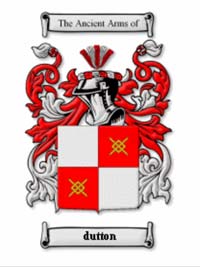 |
This
is an English locational name from either of the places so called in
Cheshire or Lancashire. Dutton in Cheshire is first recorded as "Duntune"
in the Domesday Book of 1086 and that in Lancashire as "Dotona" in
1102. They share the same derivation and meaning, which is "Dudda's
village" or "settlement", derived from the Old English pre 7th
Century personal name "Dudd(a)" with "tun", an enclosure, settlement
or village, later a town. The family of Dutton whose ancestor is
recorded below have been established at Dutton in Cheshire since the
11th Century. Hugh de Dutton was lord of the manor during the reign
of Henry II (1154 - 1189). The marriage of Thomas Dutton and Judith
Jennings is recorded in London in 1579. Among the recordings in
Lancashire is the marriage of Edmund Dutton and Alice Teeller on
February 2nd 1643 at Warrington. The first recorded spelling of the
family name is shown to be that of Odard de Dutton, which was dated
1086, The Domesday Book, Cheshire, during the reign of King William
I, "The Conqueror", 1066 - 1087. Surnames became necessary when
governments introduced personal taxation. In England this was known
as Poll Tax. |
| |
|
|
WOOD
|
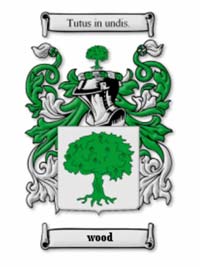 |
This
famous and popular English and Scottish surname is of pre 7th
century Olde English origins. Recorded in several forms including
Wood, Woode, Woodd, Wod, Wode and the locational Woods and Woodes,
it derives from the word "wudu" meaning a forest or wood. It was
originally given either as a topographical name for one who was
resident by a wood, or who in the case of the plural Woods related
to a person who was both resident in the wood and who obtained his
livelihood from the wood, probably as a forester. The surname is
first recorded in the early half of the 13th Century (see below) and
appears in a great variety of records during that century. These
early examples include: Roger del Wode of Yorkshire in 1274; John
Atewode of Essex, in the same year; William in le Wode of
Cambridgeshire in 1279, and Henry Bythewode of Sussex, in 1296. The
earliest recorded namebearer in Scotland was William Wod, a witness
at Cawdor in 1295. Judy Wode was christened on October 28th 1549, at
St. Margaret's church, Westminster, and Margarett, the daughter of
John Wood, was christened on October 18th 1550 at St. Nicholas Acons,
in the city of London. One of the earliest emigrants to the new
colonies of America was John Wood, aged 26 yrs., who embarked from
London on January 2nd 1634, settling in Virginia. The first recorded
spelling of the family name is believed to be that of Walter de la
Wode. This was dated 1242, in the "Fines Court" rolls of the county
of Herefordshire, during the reign of King Henry III of England,
1216 - 1272. Surnames became necessary when governments introduced
personal taxation. In England this was sometimes known as Poll Tax.
|
|
|
|
WOODMAN
|
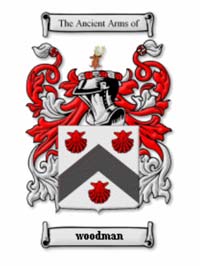 |
This
is an ancient English surname. It has several possible origins.
Deriving from the pre 7th century Olde English words "wudu" meaning
wood and "mann", a friend, foreman, or even a relative of a man
called "Wood". It is first recorded as Wudman in the famous Domesday
Book of 1086 which followed the Norman Conqest of 1066 and provided
a listing of all landowners in the country, although Hugo Wudeman of
Yorkshire recorded in the pipe rolls for that county in 1166 is
probably the first of the surname to be clearly identifiable. The
meaning of the name is obscure. It may be occupational and describe
a person who owned or worked a wood, it may have been topographical
and as such describe a dweller in a wood, or it may even have had
some lost religious or tribal origin. John Wodeman who is recorded
in the county of Dorset in the year 1213 would suggest that he lived
in a wood, although Nicholas le Wodeman of Staffordshire in 1294,
indicates that this was occupational name and described a wood
worker.
|
|
|
|
BIRD
|
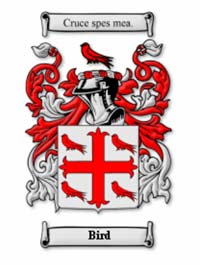 |
Recorded as Bird, Byrd, Byrde and Bride, this famous surname is
English. It derives from the pre 7th century word "bridde" meaning a
bird, and as a surname was originally given as a nickname to one
thought to bear a fancied resemblance to a bird. This may have been
from bright dress, or bright eyed and active, or perhaps to some one
with a beautiful singing voice. The surname was first recorded
towards the end of the 12th century (see below), and other early
recordings include: Ralph le Brid, a witness in the Fines Court of
Essex in the year 1231, and Richard Bird, a witness in the Assize
Court of Cambridgeshire in 1260. The variant spelling Bride, most
closely resembling the original Olde English "bridde", was first
recorded as a surname in 1332, when John Bride was listed in the
Subsidy Rolls of Cumberland, and later in the Century, Johannes
Bridde was recorded in the 1379 Poll Tax Returns of Yorkshire.
Occasionally, Bird (and its variants) may have been given as a
metonymic occupational name to a bird catcher, and as such was a
shortened form of the name "Birdclever", recorded in the 1427 "Calverley
Charters of Yorkshire". Henry Bird was an early settler in the New
World, he was recorded as purchasing a ticket for the ship "Amity"
sailing to London, in July 1679 from Barbados. Recently the name has
had much international notice through the famous cricket umpire 'Dickie'
Bird of Yorkshire. The first recorded spelling of the family name is
shown to be that of Earnald Brid, which was dated 1193, in the "Pipe
Rolls of Yorkshire", during the reign of King Richard I, known as
"The Lionheart", 1189 - 1199. |
| |
|
|
BAKER
|
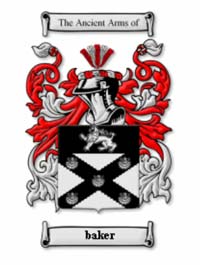 |
This
ancient surname is of Olde English pre 8th century origins deriving
from the word 'boeccure'. The surname is always occupational, but
not always for a maker of bread. There are a number of possible
origins and these include an official with special responsibilities
for the baking ovens in a monastery or castle, as well as the keeper
of the 'communal kitchen' in a town or village, since most of the
humbler households had no cooking facilities other than a pot over a
fire. The right to be in charge of this service and to exact money
or loaves in return for its use, was in many parts of Britain, a
hereditary feudal privilege. Less often the surname may have been
acquired by someone noted for specifically baking fine bread or as
an owner of a kiln for the baking of pottery or even bricks. The
surname is first recorded in the late 12th Century, and early
recordings include such examples as Robert Bakere, a witness in the
Assize Court Rolls of Lancashire for the year 1246, and Walter le
Backere in the rolls of the county of Hampshire for 1280 a.d. The
female form of the name is 'Baxter'. There have been no less than
forty two 'Baker' entries in the "Dictionary of National Biography",
and during the latter half of the 19th century the name was arguably
the most famous in the country. This was owing to the exploits of
Sir Samuel Baker, who with Stanley and Livingstone, was the greatest
African explorer, and his brother, Valentine Baker, the famous
Cavalry leader, known world wide as 'Baker Pasha'. The first
recorded spelling of the family name is shown to be that of William
le Bakere, which was dated 1177, in the "Pipe Rolls of Norfolk",
during the reign of King Henry II, known as "The Builder of
Churches", 1154 - 1189. Surnames became necessary when governments
introduced personal taxation. In England this was known as Poll Tax.
|
| |
|
|
WARREN
|
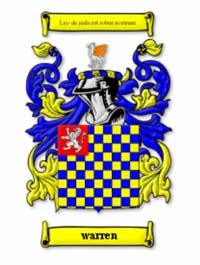 |
Recorded in the modern spellings of Warren and the much rarer Warran
and Warron, this is an English surname, but one of medieval French
origins, of which there are three. The first is locational from the
village of La Varrenne in the departement of Seine-Maritime, and
meaning the place on the sandy soil. The second topographical and
describing someone who lived by a game park, whilst thirdly it may
be occupational for someone employed in such a place. If so the
derivation is from the Norman French word "warrene", meaning a
warren or land set aside for breeding game. Introduced into England
and Scotland after the Conquest of 1066, the surname is one of the
earliest on record as shown below. Early examples of recordings
include William de Warren in the Hundred Rolls of Norfolk in 1273,
and William de Warenne, in the tax registers known as the Feet of
Fines for the county of Essex in 1285. Recordings from surviving
church registers include the marriage of William Waron and Alys Agno
on May 13th 1542, at St. Margaret's Westminster, and the marriage of
William Warren and Elizabeth Bullwack on January 25th 1544, at St.
Martin Orgar in the city of London. The first recorded spelling of
the family name is shown to be that of William de Warenne. This was
dated 1086, in the Domesday Book for London, during the reign of
King William I of England, and known as "The Conqueror", 1066 -
1087. |
| |
|
|
HARRIS
|
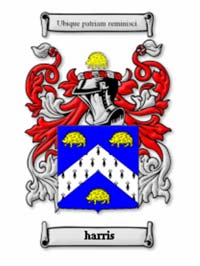 |
This
ancient surname is English, Scottish and Irish, and is recorded in
many spellings including Harry, Harrie, Harrhy, Harris, Harries, and
Harriss. However spelt, all derive from the 11th century personal
name Harry, itself a nickname form of Henry. "Henry", which
originates from the pre 7th century Frankish name "Henn- ric",
meaning "home-rule", was first introduced into Britain at the Norman
Conquest of England, in 1066, and is recorded in the famous register
known as the Domesday Book, in the year 1086. Over the next four
centuries the name in all its spellings became very popular in
England, although in Scotland the usual spelling is Harrison. The
eight English kings called officially Henry, were all referred to as
Hal or Harry. Early examples of the "Harry" surname recordings taken
from authentic medieval charters, and showing the surname
development, include Nicholas Herri, in the 1327 Subsidy Rolls of
Worcestershire, and William Harrys, in the Eynsham Cartulary of
Oxford, in the year 1406. Later recordings include those of Walter
Harris (1647 - 1732), a court physician to King Charles II, and
later William and Queen Mary, 1689 - 1694. The first recorded
spelling of the family name is believed to be that of John Harry,
which was dated 1273, in the "Hundred Rolls" of the county of
Buckinghamshire. This was during the reign of King Edward I, known
as "The Hammer of the Scots", 1272 - 1307.
|
| |
|
|
KNIGHT
|
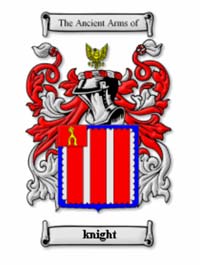 |
This
is a medieval status name from the Olde English pre 7th Century "criht",
meaning boy, youth or serving lad, later extended to mean a tenant
bound to serve his lord as a mounted soldier and therefore a man of
some importance and substance. Later still, with the changes in the
social structure of medieval England, the term "knight", (Middle
English "knyghte") meant an honourable estate conferred by the king
on men of noble birth who had served him well. The "Knights" of
today, however, are far more likely to be descended from a servant
in a knight's household or from someone who played the part of a
knight in a medieval pageant or won the title in some contest of
skill. Early recordings of the surname from this source include:
Walter le Knit (1200, Oxfordshire), William Knight (1221,
Worcestershire), and John Knyght (1275, Suffolk). Over fifty Coats
of Arms have been granted to this illustrious family, one of the
earliest being that granted to Thomas Knight of Hol, Northampton, in
1546. The first recorded spelling of the family name is shown
to be that of Godefridus Niht, which was dated 1166, in the "Norfolk
Pipe Rolls", during the reign of King Henry II, known as "The
Builder of Churches", 1154 - 1189. Surnames became necessary when
governments introduced personal taxation. In England this was known
as Poll Tax. |
| |
|
|
SALTER
|
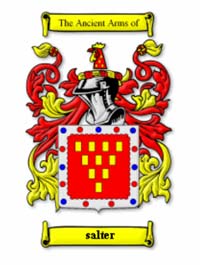 |
Recorded as Salt, Salter, Sulter, Saltman and Salterman, this is an
English surname of two possible origins. The first is occupational
and describes an extractor or seller of salt, the derivation being
from the Olde English pre 7th century world "sealt" meaning salt.
The surname from this source is first recorded towards the middle of
the 13th century (see below), and Thomas le Selter appears in the
Subsidy Rolls of Sussex in 1296, whilst John Saltman is recorded in
the Pipe Rolls of Suffolk in 1327. The second distinct possibility
is that the name derives from the pre 7th century Olde French words
"saltere or sautere", meaning a psalter. This was a stringed
instrument like a harp, which was very popular in the medieval
period. In the Assize Court rolls of Northumberland, we have the
recording of a musician called William le Salterer, meaning one who
played the psalter, whilst another recording is that of William le
Sautreour. He was minstrel to Queen Margaret, the wife of King
Edward I (1272 - 1307) in the Calendar of Letter Books for the City
of London, dated 1304. An interesting namebearer was one James
Salter who flourished around the year 1723. He was a proprietor of
"Don Saltero's Coffee-house", Chelsea, where he gathered a large
collection of curiosities. The first recorded spelling of the family
name is shown to be that of Robert le Salter. This was dated 1243,
in the Assize Court Rolls of Somerset, during the reign of King
Henry III of England, 1216 - 1272. |
| |
|
|
LILLEY
|
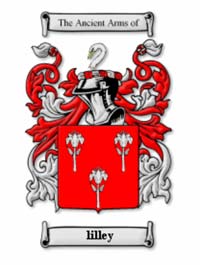 |
This ancient
surname can be of either Olde English or medieval origins. It has
three possible sources, the first a diminutive nickname from the
personal name 'Elizabeth'. This name derives from the hebrew 'Elishera',
which translates as 'god is my guardian' or similar, and was
introduced by the Crusaders in the 12th century. As Elizabeth it
became the most popular English female name, and a source of many
pet or nicknames. The second origin is from the nickname 'Lilie',
originally used as a baptismal name for a baby with a particularly
fair complexion. Here the derivation is from the Old English pre 7th
Century 'lilie', meaning the lily flower, itself from the
Roman-Latin word 'lilium'. Lastly the surname can be locational,
from either of two villages called 'Lilley' in Hertfordshire and
Berkshire. The village names were recorded in Domesday Book (1086)
and they translate as 'the clearing where flax was grown', from the
Old English 'lin', meaning flax, and 'leah', - a clearing. The
'modern' surname spelling is found as Lilly, Lil(l)ey, Lil(l)ie and
Lely, whilst early recordings include such examples as Thomas Lylie
of Wakefield, Yorkshire in 1296, Hugh Lily in the Hundred Rolls of
Lincoln for 1275, and William Lely of Norfolk in the same year. The
christening of John Lilley was recorded at St. Botolph without
Aldgate, London, on November 23rd 1578, whilst Henry Lilly, who died
in 1638, was the Rouge Dragon pursuivant of the College of Heralds
in the time of King Charles I (1625 - 1649). The coat of arms has
the blazon of a red field, with three white lilies slipped. The
first recorded spelling of the family name is shown to be that of
Alan Lilie, which was dated 1247, a witness at the 'Bedfordshire
Assizes', during the reign of King Henry III, known as 'The
Frenchman', 1216 - 1272. Surnames became necessary when governments
introduced personal taxation. In England this was known as Poll Tax.
|
| |
|
| |
|
| |
|
| |
|
| |
|
| |
|
| |
|
| |
|
| |
|
| |
|
| |
|
| |
|
|
|
